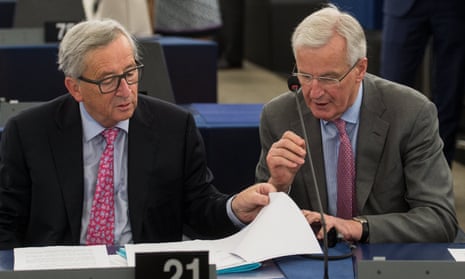The EU’s chief Brexit negotiator, Michel Barnier, fears the refusal of member states to soften their demands over the size of Britain’s “divorce bill” could lead to a collapse in talks and the UK crashing out of the EU without a deal, minutes of a meeting of the European commission reveal.
Barnier has told the commission president, Jean-Claude Juncker, and other senior officials that the stakes are so high because Berlin and Paris are refusing to pay more to cover the UK’s departure, while those governments who receive the most from EU funds are opposed to any cuts in spending.
“Mr Barnier considered that this issue would doubtless be one of the most difficult in the negotiation,” the minutes of a top-level meeting held earlier this month note.
“However, should there be no agreement on this point, he believed that the risk of failing to reach an agreement on an orderly withdrawal of the United Kingdom would become real, since none of the 27 member states wished to contribute more to the current multi-annual financial framework or receive less in projects financed under the framework.”
As positions have hardened on the continent, with estimates of the size of the bill now reaching as much as €100bn, Juncker noted that Theresa May appeared to be softening up the British public for failure to strike a deal.
The minutes show that the commission president warned Barnier that he feared that the EU negotiator’s hopes of coming to an agreement by the end of the year were over-optimistic. “He [Juncker] noted that on the UK side, the government was trying to gain credence for the idea that if agreement were not reached on all the negotiating points, including those in the second phase, there would be no overall agreement on its orderly withdrawal,” the official minutes report. “He also expressed concerns about the ambition of the timetable referred to, since he considered that some of the matters to be negotiated in the first phase would take time.”
The commission then discussed “the need to integrate in the parameters for the future negotiations the growing support in British public opinion for the idea of a disorderly exit of the UK from the union”, the minutes say.
Barnier told the meeting that he “hoped that after the British legislative elections the UK’s internal political climate would be more conducive to reaching agreement”.
The former French finance minister, however, told his colleagues that “since a general election had been called for 8 June in the United Kingdom [negotiations] would not in fact be launched before mid-June”, rather than the end of this month.
The meeting also discussed the EU’s hope of organising negotiations in four-week cycles. The first week of each cycle would involve political preparation, followed by a week of document disclosure between the two negotiating teams.
The third week would see Barnier and the the UK’s Brexit secretary, David Davis, sitting down to negotiate. In the fourth week, Barnier would report on the results to the 27 member states and the European parliament.
“Once this agreement had been achieved, the EU member states wished to close this part of the negotiations once for all without going back to it,” Barnier told the commission – a position that would prevent the UK reopening issues such as the divorce bill in order to gain leverage in the trade talks.
Any hopes the UK may have had of using security cooperation as bait for a better deal, were also dismissed on Thursday by the EU’s high representative for foreign affairs, Federica Mogherini.
Announcing the founding of an EU military headquarters, in the face of some British resistance, Mogherini told reporters: “We will define together how the future relations will be in this field but this is not a field where one side has to perceive itself as stronger than the other, on the contrary.
“The UK is an important foreign policy, security and defence player but nothing compared to the other 27 together. So there is no trade-off imaginable.”
Mogherini added: “The UK contributes to our civilian mission by 3% and military operations by 5% and that is mainly the headquarters in Norfolk. And obviously the headquarters will not be in a non-member state in the future. So there is not such significant contribution to our missions and operations form the UK to be put on the table.”
